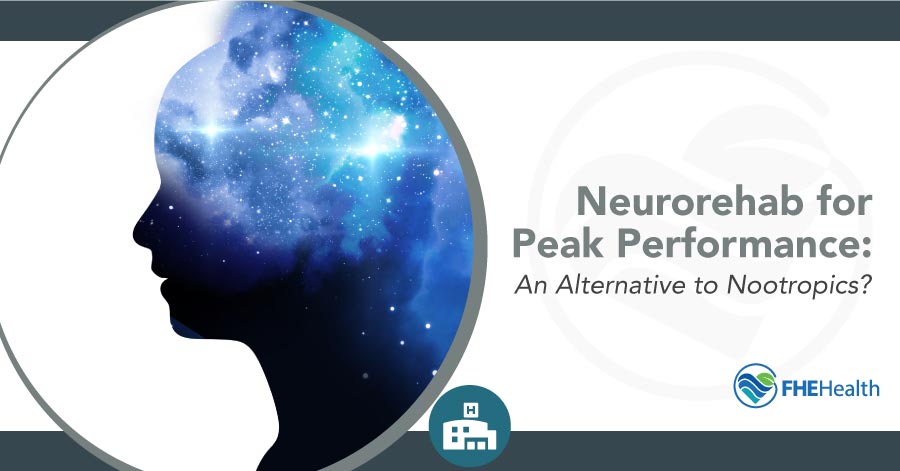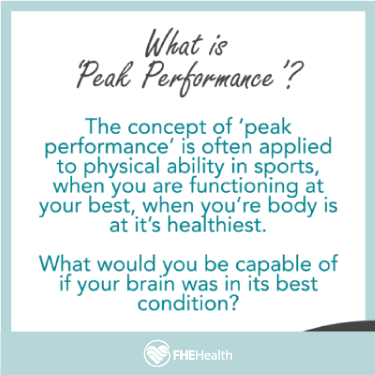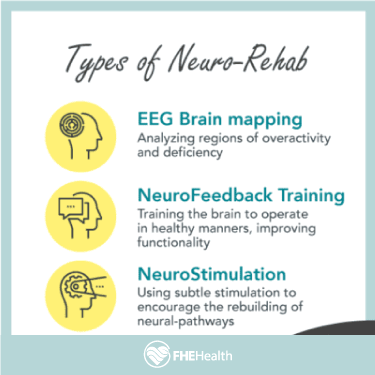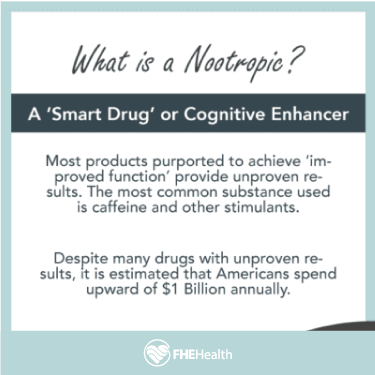
Imagine what could happen if your brain was working at its highest, most efficient level. If you were a musician, you could compose your best work and play it with confidence. If you were an executive, you could make financial decisions with clarity. While this may seem like wishful thinking, it is possible to improve your brain’s performance, allowing you to achieve more than you could otherwise. Medications or therapies that purport to improve cognitive ability are known as nootropics.
At FHE Health, we use neuro-rehab technology as one of our treatment options. It allows men and women to enhance the way their brain thinks and functions to minimize complications and enhance performance.
Consider What Peak Performance Is
 Achieving peak performance is often something only thought about in sports. A person who is training for an event works hard physically to improve his or her skills. Yet, there’s also a component of brain training. That is, it’s also important to train the brain to see beyond that necessary skill. By envisioning that task at hand, it’s more likely a person can reach that higher level.
Achieving peak performance is often something only thought about in sports. A person who is training for an event works hard physically to improve his or her skills. Yet, there’s also a component of brain training. That is, it’s also important to train the brain to see beyond that necessary skill. By envisioning that task at hand, it’s more likely a person can reach that higher level.
Peak performance like this can be achieved by anyone. It can be done by performers or executives. It can also enhance your brain’s ability to perform and improve as you recover from anxiety and mental health illnesses. Imagine, then, what could happen if you could train your brain to achieve wellness, recovery and strength during rehab and recovery.
What Is Neuro-Rehab, and How Can It Help You?
Neurotherapy, or neuro-rehab technology, works to train your brain through improved neuroplasticity. It helps you focus and allows you to teach your brain how to accomplish goals at a much higher level than you may have been able to do previously.
The use of neurostimulation increases neuroplasticity. You may have heard of this as a type of game or a method of improving your brain’s function. The science behind it is a bit more complex. The term describes the brain’s ability to reorganize and form new connections throughout your lifetime. Researchers have found that the brain changes by forming these pathways of communication as it goes through life.
When a person has a disease or an injury or is involved in a new type of activity, the brain works to create new neurons to help adjust to the new situation. For example, in some people, when one side of the brain suffers an injury, the other side of the brain can begin to take over some of those functions. This happens because the brain reorganizes to compensate for the damage.
What Is a Neuro-Rehab Session Like?
Unlike regular psychological therapy, neuro-rehab sessions don’t consist of talk or behavioral therapy. Neuro-rehab is unique for its empirical focus on the brain and encouraging new healthy neural pathways to improve mental life. Neuro-rehab is “brain training” that can treat a variety of disorders and improve cognitive performance.
Brain wave measurement using EEG can detect dysfunctional cognition and neurological habits. When detected, this data turns into live feedback for the patient. This way, they can become aware of any maladaptive brain activity and focus on improving it. Neuro-rehab sessions typically consist of two components: transcranial magnetic stimulation (TMS) and neurofeedback.
What Is TMS?
TMS is a non-invasive brain stimulation technique that uses magnetic fields to induce electrical currents. It’s delivered with a figure-eight coil targeting regions on the surface of the brain. Various regions of the human cortex are involved in behavioral and cognitive functions. So, despite only having the ability to produce fields that reach the outer layer of the brain, TMS can do a lot.
TMS is an FDA-approved treatment for major depressive disorder. It’s also used clinically for a range of other psychiatric and cognitive problems. It’s proven to improve cognitive performance in patients with stroke and traumatic brain injury and enhance motor learning and skill acquisition in healthy individuals.
As such, TMS is a great tool for improving cognitive performance, especially following neurological injury or for people who feel their cognitive performance is deteriorating.
What Is Neurofeedback Training?
Neurofeedback or biofeedback is a type of therapy that uses real-time feedback to help people learn to self-regulate brain activity. For many years, it was thought that neurofeedback could only be used to treat disorders like ADHD and depression. However, recent research has shown it can also be an effective tool for cognitive rehabilitation. One study found that neurofeedback can help stroke survivors improve their attention and executive function.
Another study found that veterans with PTSD who underwent neurofeedback showed significant improvement in symptoms like anxiety, depression and irritability. These studies suggest neurofeedback may be an effective treatment for a wide range of cognitive impairments and can also improve cognitive function. It’s now used in many clinics worldwide and is helping people recover.
What Is Neuroplasticity?
So, what’s the magic trick behind TMS and neurofeedback? The simple answer is — your own brain. Neuroplasticity refers to the brain’s amazing ability to reorganize itself and form new connections. This means it’s extremely resilient to damage and through practice, it can usually be retrained in a desirable way. Neuroplasticity is our brain’s ability to form new connections between brain cells and brain regions. So, even when an area is damaged, the brain can often compensate. This ability is what underlies neuro-rehab treatment and makes it so effective
How Can Neuro-plastic Change Boost Performance?
A reduction in cognitive performance may result from brain cell death in regions involved in cognition. While we can’t grow new brain cells after the age of 25, the number of neural connections has been implicated in high performance, even more than the number of brain cells. So, creating new connections through neuro-rehab brain training assisted with neuro-rehab nootropics can lead to enhanced performance.
How Changes Happen in the Brain
 This type of new neuron formation doesn’t just happen instantly. Rather, the neurons need some type of stimulation to get them to start being active and sprouting. One form of stimulation used is called transcranial direct current stimulation or tDCS.
This type of new neuron formation doesn’t just happen instantly. Rather, the neurons need some type of stimulation to get them to start being active and sprouting. One form of stimulation used is called transcranial direct current stimulation or tDCS.
In this form of stimulation, numerous electrodes are attached to the patient’s head. Then, a low direct current is passed through these electrodes to the brain. It is very safe to use and creates a significant improvement in many people, stimulating specific areas of the brain to create an activity that causes neurons to sprout.
Examples of Use
The use of neuro-stimulation like this, including tDCS, isn’t uncommon. For example, the US Army is using it as a way to reduce training time in snipers, and it has been used in Olympic skiers and snowboarders to help increase focus — all with the goal of trying to achieve peak performance.
Still Unsure About Peak Performance?
The movie “Limitless” is a good presentation of what achieving peak performance is, though its focus is a bit different. In the science fiction thriller, a struggling writer is introduced to a drug called NZT-48. The drug gives those who use it the ability to fully use their brain. As a result of this, it significantly improves the character’s lifestyle. He is suddenly able to achieve amazing things, all because his brain is working at its highest level possible.
While the nootropic drug in this film isn’t real, the actual ability to create neurons in the brain that develop a better ability to focus, heal and recover very much is. That’s the goal of neuro-rehab technology.
How Can Brain Training Help with Addiction and Mental Health?
 Neuro-therapy like this can be highly effective in aiding in addiction recovery and mental health improvement. In a study published by the U.S. National Library of Medicine, neurofeedback was used to treat patients who were dependent on opiates. The study found that individuals who received the treatment had less withdrawal impact, better physical health and an anticipated positive outcome.
Neuro-therapy like this can be highly effective in aiding in addiction recovery and mental health improvement. In a study published by the U.S. National Library of Medicine, neurofeedback was used to treat patients who were dependent on opiates. The study found that individuals who received the treatment had less withdrawal impact, better physical health and an anticipated positive outcome.
In most situations, it works as a component to addiction treatment and as a cognitive stimulation and rehabilitation tool. It helps people in therapy to see improvements in their health by helping them to apply drug treatment more effectively. By stimulating the brain’s plasticity, it is possible to help those with an addiction to learn techniques and strategies for avoiding drugs, coping with situations and working through negative thought patterns.
It also helps to create improved physical health in some people. With this type of brain training, many people report:
- A better ability to focus
- More mental agility
- Improved memory
- A better temperament
- The ability to learn at a faster rate
- The ability to remain calm in high-pressure situations
- Less anxiety and stress
- Improved processing rates for complex information
- Better relationships
All of these factors and many others can help an individual in addiction treatment to excel. While no one is claiming neuro-rehab technology is the only component of treatment, it is often one of the best ways to see enhanced success as you enter rehab. What’s more, there are no symptoms or negative outcomes from the use of this technology, only benefits.
FHE Health Offers Neuro-Rehab Technology to You
As a leading provider of drug and alcohol addiction treatment, FHE Health continuously offers the most advanced care options for patients. That includes providing you with access to your peak performance. Meet with our admissions counselors today to learn more about how we can help you recover.






